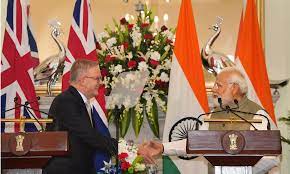NEW DELHI, Mar 12: India is considering to discuss a mechanism with Australia for a smooth supply of their critical minerals under the comprehensive free trade agreement amid a huge demand in the domestic market, according to sources.
India and Australia have implemented an economic cooperation trade agreement (ECTA) in December 2022, and now negotiations are on for expanding the scope of that agreement into a comprehensive pact (Comprehensive Economic Cooperation Agreement or CECA).
There is a huge demand for critical minerals like lithium, titanium, vanadium, cobalt, nickel, and graphite in India as the country is targeting to boost the production of renewable energy by 2030.
Batteries will enable the current energy transition towards electric mobility, integration of renewable energy through grid-scale storage and improved energy access in India.
India’s lithium-ion battery manufacturing capability is currently limited, and existing manufacturers are largely reliant on imports.
There is an MoU (memorandum of understanding) signed between Khanij Bidesh India Ltd (KABIL) — a joint venture of three central public sector units under the Ministry of Mines — and the Critical Minerals Facilitation Office (CMFO), Government of Australia, which aims at strengthening bilateral trade relationship and lays the path to deliver on a shared ambition to develop secure, robust and commercially viable critical minerals supply chains.
The sources said that at present, nothing has been finalised, but there is a consideration that “we can think of some kind of mechanism under which India can get assured supply of these minerals”.
“We have to work on the details. How to craft that mechanism. It is broad thinking at present. It has never happened in any free trade agreement. We have an MoU with Australia. Now, we are thinking about how we can strengthen that MoU,” they added.
According to an official statement issued on March 11, India and Australia have reached a major milestone in working towards investment in critical minerals projects to develop supply chains between the two countries.
Australia produces almost half of the world’s lithium. It is also the second-largest producer of cobalt and the fourth-largest producer of rare earth.
Critical minerals are key raw materials for several high-demand manufactured goods. These minerals have applications in different sectors, including metallurgy, chemical industries and energy storage systems for renewable energy, electric mobility, power generation, high-end electronics and defence.
Due to their importance, India is looking at a source for a smooth supply.
The economic importance of these minerals and the risks in their stable supply make them important strategically also. (PTI)


